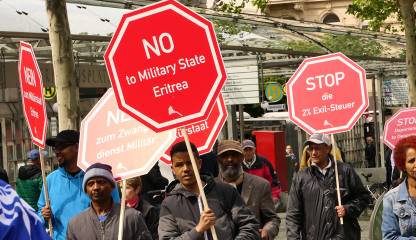Eritrea: Cooperation with the wider Eritrean democracy movements recommended
Intergroup discussion on Eritrea in the Bundestag
(29.06.2020) On 25 June 2020, a public intergroup zoom discussion was held at the invitation of Rudi Friedrich (Connection e.V.) and Kathrin Vogler (MdB, Die Linke). Several experts as well as members of the German parliament parties SPD, FDP and the parliamentary group Bündnis 90/Die Grünen took part in the discussion. More than 60 persons from about 10 countries were following the discussion.
At the beginning of the discussion, Rudi Friedrich explained that since the peace agreement between Ethiopia and Eritrea, the European Commission has been supporting a road construction project. "In this respect, human rights organizations have sharply criticized the fact that within the framework of this project, forced labour is carried out within the national service to be performed in Eritrea for an unlimited period of time". (…more)
The peace agreement had raised hopes that the Eritrean regime under the dictatorship of Isayas Afewerki would lift the internal state of war against its own people. "But unfortunately this is not the case," said Rudi Friedrich. "Terror, violence and forced labour continue to dominate everyday life in Eritrea."
Kathrin Vogler added: "Currently, the decision is pending on a financial contribution by the EU to further UN measures, e.g. to promote the administration of justice and economic growth in Eritrea as well as return programmes for Eritrean refugees - financial resources which would flow more or less directly to the dictatorial regime of Afewerki.“
Mulueberhan Temelso, Director General of the Foundation Human Rights for Eritreans (The Netherlands), made it clear why the Foundation strongly rejects the European Commission’s funding programme and filed a complaint against the European Commission in court: "The project does not improve the situation of the population in Eritrea in any way. The project is in the hands of the Red Sea Trading Corporation, which is under the control of the sole ruling party in Eritrea. The project promotes forced labour by national service providers and strengthens the Eritrean regime. The European Union is thereby violating its own principles as well as the demands of the UN Special Representative on Human Rights in Eritrea.” (…more)
"There is a long history in the EU of supporting the Eritrean regime through aid," said Klara Smits from Europe External Policy Advisors (EEPA). "It has been shown repeatedly that the regime under Isayas Afewerki is unwilling to comply with basic benchmarks on human rights.”
Dr. Awet Kessete from the Eritrean Association for Democracy, Culture and Learning from Each Other showed possible ways to determine the criteria for projects: "The projects must serve to improve the living conditions of the population, it must be excluded that the funds serve to enhance the regime, humane working conditions and the living interests of the population must be secured and in all projects the participation of the population must also be ensured.”
Ulrich Lechte (MdB, FDP) stated that after the peace agreement between Ethiopia and Eritrea there was genuine hope for strong transformations in Eritrea. It was only natural in this context to create connections and support the peace agreement with the road construction project. It goes without saying, explained Lechte, that the use of conscripts within the national service used as forced labourers must be condemned.
Dr. Daniela de Ridder (MdB, SPD) added that the road construction project was intended to support economic development, tourism and trade. In view of the experiences with the project, it shows that it is necessary in the future to enforce the applicable labour standards, for example through the International Labour Organization (ILO).
Ottmar von Holtz (MdB, Bündnis 90/Die Grünen) called for a more courageous role for Germany in respecting human rights in Eritrea. Germany should press much harder through international bodies such as the United Nations to ensure that human rights criteria are actually implemented. Germany should also cooperate more closely with the International Criminal Court.
"It should not be forgotten", Kathrin Vogler said afterwards, "that due to the situation in Eritrea, many people, especially young people, feel forced to flee the country. One main reason for this is the indefinite military service." Connection e.V. and Pro Asyl had already pointed out in an expert discussion in December 2019 that the European Union is trying its utmost to prevent Eritrean refugees from coming to Europe. In the meantime, the recognition rates in Germany have also dropped considerably. "Without family asylum, only about 5% of Eritrean refugees have received a refugee status in 2019." (…more)
Finally, Mulueberhan Temelso and Awet Kessete emphasized that the German government and the European Union must work much more closely with the Eritrean democracy movements and decide on projects together. "We need cooperation between the German government and the European Union with the democracy movements in the diaspora," said Awet Kessete.
Connection e.V.: News, June 29, 2020
Keywords: ⇒ Civil Society ⇒ Eritrea ⇒ Human Rights ⇒ Militarization



